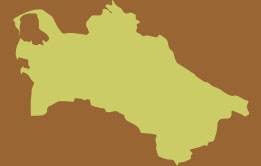Turkmenistan’s constitution includes protections of free expression and access to information. In practice, however, the authoritarian regime ruled by His Excellency Saparmurat Niyazov, President-for-life and self-appointed “Turkmenbashi,” or “father of all Turkmen,” shows no such commitment. In fact, the totalitarian apparatus that dominates Turkmenistan is one of the world’s most thorough, maintaining strict control of media in all its forms.
The current regime in Turkmenistan bears many of the hallmarks of other totalitarian communist states. A domestic mass media isolates the country’s populace from outside information while stoking the cult of personality surrounding the country’s leader. The president personally appoints all editors of print and broadcast media and requires that all content be approved by his office. In addition, the regime has limited the spread of media-related technology, banning cable television and satellite dishes, while making Internet access prohibitively expensive and subject to state control.
The system permits virtually no dissent, and independent journalists are frequently beaten and harassed. However, some alternative broadcasts do breach the media barrier: The U.S. government-funded Radio Free Europe/Radio Liberty (RFE/RL) and the Russian Mayak radio station provide alternative sources of news. In response to the threat posed by media outside of state control, Turkmenistan’s National Security Service has over the past two years arrested and threatened at least three RFE/RL free-lance journalists, pressuring them to sever ties to the U.S.-funded broadcaster. International condemnation, including protests by global press freedom groups, has thus far been helpful in freeing these journalists, however they still face charges of slander and instigating domestic hatred and strife.
- Previous: Russia
- Next: West Bank and Gaza



